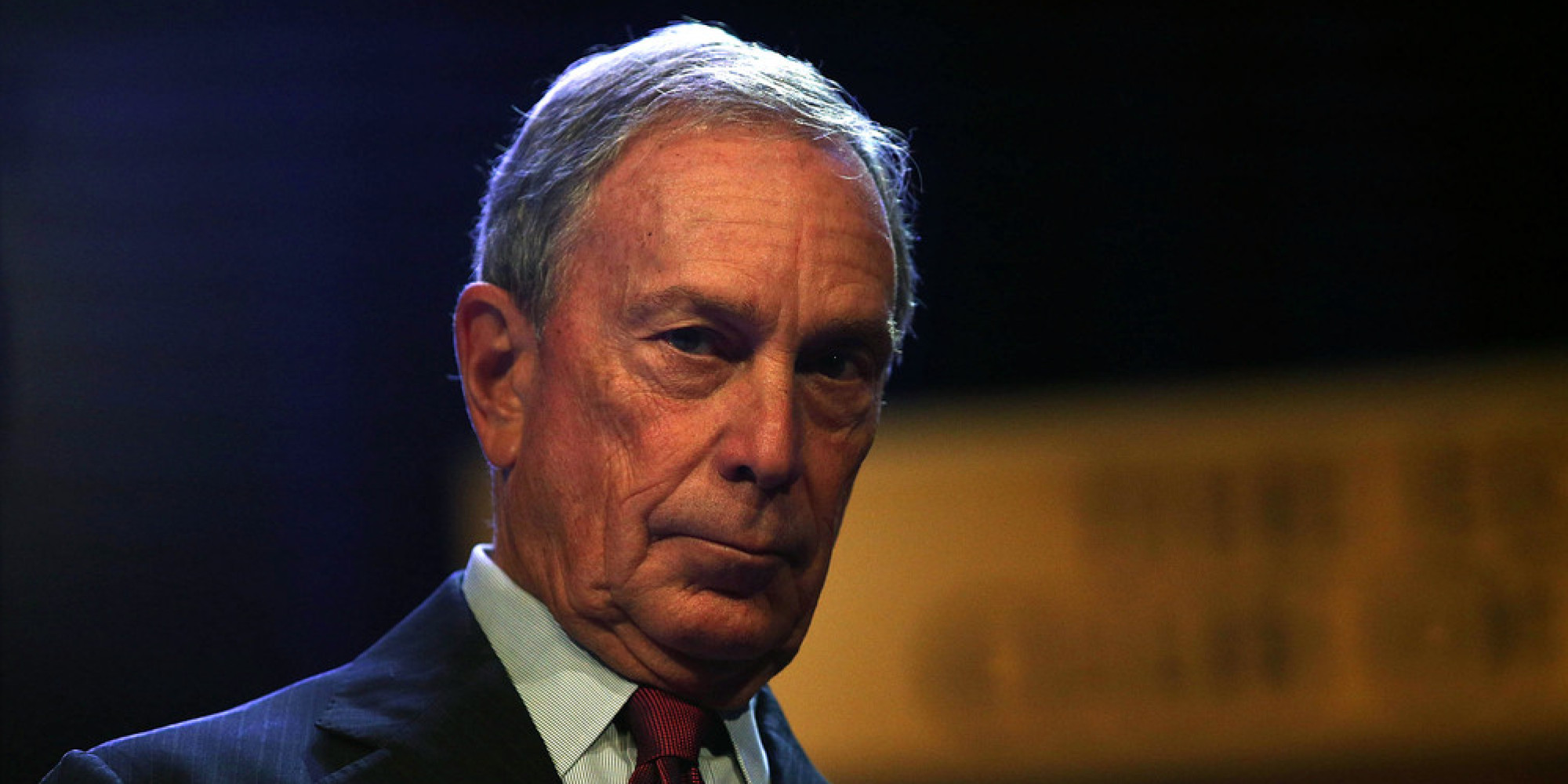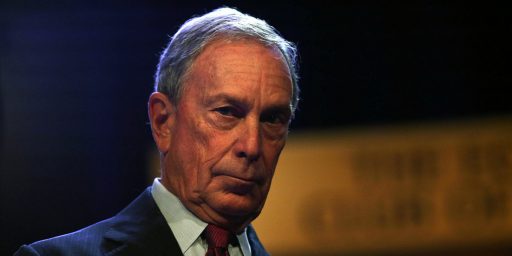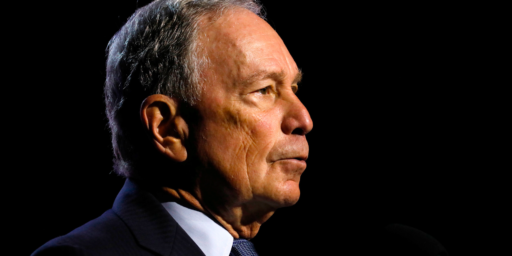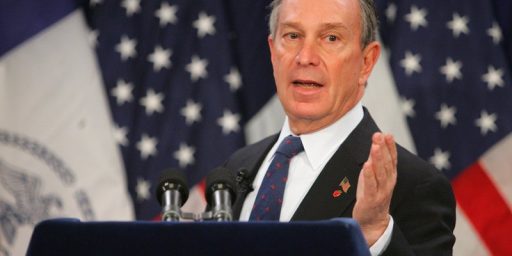Michael Bloomberg Not Running For President
For the fourth time since the 2008 election cycle, Michael Bloomberg flirted with the idea of running for President. For the fourth time, he declined to do so.

Former New York City Mayor Michael Bloomberg has announced he’s not running for President:
Michael R. Bloomberg, the former New York City mayor who joined the Democratic Party last year to crusade against President Trump, announced he would not seek the White House himself in 2020, discarding plans to mount a maverick campaign that would have tested the party’s openness to a wealthy centrist with a chameleon-like approach to partisan politics.
Mr. Bloomberg’s decision appears to reflect a recognition of the long odds he would have faced as a moderate newcomer in an unapologetically liberal party, and his own unsentimental calculus about the trade-offs involved in running. After conducting polling and other research, Mr. Bloomberg’s advisers concluded he would have a real but narrow path to the nomination — and that it could all but vanish if Joseph R. Biden Jr., the former vice president, entered the race.
“I believe I would defeat Donald Trump in a general election,” Mr. Bloomberg wrote, in a Bloomberg News column announcing his decision. “But I am clear-eyed about the difficulty of winning the Democratic nomination in such a crowded field.”
Though Mr. Bloomberg is aligned with Democrats on a range of issues like climate change and gun violence, he is also a proudly pro-business centrist in a party that has moved sharply to the left in its rhetoric and policy proposals. And his record on policing as mayor, as well as his generally favorable view of Wall Street, would likely have proven troublesome in a field that is establishing litmus tests on social justice and corporate power.
In his column, Mr. Bloomberg cautioned Democrats not to shift too far to the left.
“It’s essential that we nominate a Democrat who will be in the strongest position to defeat Donald Trump and bring our country back together,” he wrote. “We cannot allow the primary process to drag the party to an extreme that would diminish our chances in the general election and translate into ‘Four More Years.'”
Rather than entering the race himself, Mr. Bloomberg intends to plow his political energy and immense personal fortune into other efforts to thwart Mr. Trump and his agenda, including an initiative aimed at rapidly accelerating the country’s transition to renewable energy. He also expects to be heavily involved in the 2020 general election, organizing and financing opposition to Mr. Trump.
Mr. Bloomberg, 76, notified advisers of his decision on Monday, capping months of exhaustive research into the possibility of running as a Democrat. Polling and focus groups found that Mr. Bloomberg had a path to the Democratic nomination, his advisers said, but that he would likely struggle to compete if Mr. Biden were to run.
(..,)
Mr. Bloomberg and his advisers studied the presidential landscape for months, conducting national and state-level polling and holding focus groups with voters around the country. They concluded that he would have had significant strengths even in a crowded Democratic race, including his biography as a self-made entrepreneur and his extraordinary stature as a philanthropist.
Mr. Bloomberg was so serious in his considerations that he had begun discussing with aides how he would structure operations in the White House, including the possibility of implementing the same bullpen-style office space he used at City Hall in the East Wing. He had three different teams of advisers briefing him on foreign, defense and domestic policy, with the latter led by Bruce Reed, a former chief of staff to Mr. Biden, according to a Bloomberg adviser.
But there were also neon-lit warning signs for Mr. Bloomberg, an avowed technocrat who was first elected mayor as a Republican in 2001. Populist liberals, including Mr. Sanders and Senator Elizabeth Warren of Massachusetts, have framed their candidacies around opposing the influence of money in politics — arguments that might have stung Mr. Bloomberg with particular force.
So, too, might the scrutiny facing the wider field of Democratic candidates on the issue of criminal justice policy. Other contenders, including Mr. Biden and Senator Kamala Harris of California, have been pushed onto the defensive for having pursued traditional tough-on-crime policies in the past. As mayor of New York, Mr. Bloomberg supported stop-and-frisk policing, which was found to target black and Hispanic people disproportionately.
In a September interview, Mr. Bloomberg expressed no regret about employing aggressive policing tactics as mayor, and questioned whether many of the allegations arising as a result of #MeToo deserved to be believed. He described his emerging identity as a Democrat as something of a default choice, citing his support for abortion rights.
“It’s impossible to conceive that I could run as a Republican — things like choice, so many of the issues, I’m just way away from where the Republican Party is today,” Mr. Bloomberg said.
As noted, Bloomberg explained his decision in a column at, well, Bloomberg News:
I’ve never made any secret of my belief that Donald Trump is a threat to our country. At the 2016 Democratic National Convention, I said: “New Yorkers know a con when we see one.” Last fall I spent more than $100 million supporting Democrats in the midterm elections. Republicans in Congress had failed — and are still failing — to fulfill their constitutional duty to hold the president accountable. Instead, they indulge his worst impulses and refuse to work with Democrats on the most urgent issues.
It’s essential that we nominate a Democrat who will be in the strongest position to defeat Donald Trump and bring our country back together. We cannot allow the primary process to drag the party to an extreme that would diminish our chances in the general election and translate into “Four More Years.”
Many people have urged me to run. Some have told me that to win the Democratic nomination, I would need to change my views to match the polls. But I’ve been hearing that my whole political career.
I’ve run for office three times and won each time, in no small part because I’ve never stuck my finger in the wind to decide what I should believe. It’s not who I am, nor do I think it’s what voters want in a leader. They want someone who levels with them, even when they disagree, and who is capable of offering practical, sensible, and ambitious ideas — and of solving problems and delivering results.
I come out of the business world. I’ve had executive jobs in both the private sector and government. Finding solutions to tough problems is my life’s passion. My skills are in building and leading teams that draw up innovative plans and then work together to implement them. I think this is exactly what our country needs in a president, especially after what will be four years of chaos, disruption, and deceit.
I know what it takes to run a winning campaign, and every day when I read the news, I grow more frustrated by the incompetence in the Oval Office. I know we can do better as a country. And I believe I would defeat Donald Trump in a general election. But I am clear-eyed about the difficulty of winning the Democratic nomination in such a crowded field.
There is another factor that has weighed heavily on my mind: the likelihood that our biggest national problems will worsen over the next two years. With a leader in the White House who refuses to bring the parties together, it will be nearly impossible for Congress to address the major challenges we face, including climate change, gun violence, the opioid crisis, failing public schools, and college affordability. All are likely to grow more severe, and many of the president’s executive actions will only compound matters.
(…)
In the weeks and months ahead, I will dive even deeper into the work of turning around our country, through concrete actions and results. And I will continue supporting candidates who can provide the leadership we need — on climate change, gun violence, education, health, voting rights, and other critical issues — and continue holding their feet to the fire to deliver what they promise.
I hope those who have urged me to run, and to stand up for the values and principles that they hold dear, will understand that my decision was guided by one question: How can I best serve the country?
While there would be no higher honor than serving as president, my highest obligation as a citizen is to help the country the best way I can, right now.
This isn’t the first time that Bloomberg has considered a run for the nation’s highest office, nor it is the first time that he has ultimately decided to ass on the effort. As James Joyner noted in a post all the way back in 2006, there was speculation thirteen years ago that Bloomberg, who was then still serving as Mayor of New York City, might run in the upcoming 2008 race as an independent. No such run took place, of course, but the rumors continued well into 2007, at which time James Joyner correctly noted that an independent bid at that time would have likely helped Democrats in the 2008 election. before finally fizzling out. Four years later, as the 2012 elections drew closer and again while he was still serving as Mayor, the rumors of a Bloomberg Presidential run, either as an Independent or as a Republican, returned. As I noted at the time, while Bloomberg was denying at the time that he was running he certainly was sounding at the time like someone who was at least thinking about it, Because of this, pundits continued to speculate about what kind of impact a Bloomberg run, apparently as an Independent, might look like in 2012. Again, Bloomberg passed up an opportunity to run in that election. Four years later, there was again speculation about an independent Bloomberg bid, especially in as it became more and more apparent that Donald Trump was going to win the Republican nomination. While polls at the time showed little public enthusiasm for a Bloomberg run, it was later reported that the now former Mayor had come closer to actually getting into the race than he had in the past but that he ultimately concluded that his presence in a race between Trump and Hillary Clinton would help Trump and hurt Clinton. Based on this, he decided not to run yet again.
As we got closer to the beginning of the 2020 cycle, there were signs that Bloomberg might be more serious about running for President than he has been in the past. The first sign of this came last October when it was reported that he had changed his party registration to the Democratic Party. On some level, this was hardly a surprise since Bloomberg had been a registered Democrat before switching parties to become a Republican largely for the purpose of running for Mayor of New York City since his advisers had concluded, with good reason, that it would have been difficult if not impossible for him to win the Democratic Primary in 2001 as a Democrat. Prior to that, though, Bloomberg had revealed his return to the Democratic fold with the announcement that he was prepared to spend millions of dollars to help Democrats regain control of Congress in the 2018 midterms. In the end, it’s estimated that Bloomberg put as much as $100 million into the effort. On the eve of the General Election last year, it was reported that Bloomberg was inching closer to getting into the 2020 race as a Democrat and that he was willing to open his own pocketbook to fund his campaign. More recent reports stated that Bloomberg, who apparently had again assembled what would have been a highly experienced team of advisers as he had in 2016, was planning on a run that ran more to the center of the Democratic Party than a campaign that appealed to the progressive wing of the party. In the meantime, sources around the former Mayor said that an announcement was likely by mid-April. Now, of course, we have that decision but given the fact that Bloomberg has come close to running in the past only to back away, his decision this time shouldn’t be all that surprising.4
With Bloomberg out of the race officially, this is likely to increase attention on former Vice President Joe Biden, who is still considering the idea of getting into the race for the Democratic nomination. Like Biden, Bloomberg likely would have run a campaign that was more center-left than the “progressive” campaign that candidates such as Bernie Sanders, Elizabeth Warren, and others seem to be running. With Bloomberg out of the race, that lane would largely be one that Biden himself would dominate to the point where it would be difficult for any of the candidates to his left to challenge him. Given that it seems clear that this center-left wing of the party is larger than the so-called “progressives,” this would arguably give Biden advantage going forward that the other candidates in the race would not have. This doesn’t mean, of course, that Biden definitely will run, or that he will win the nomination if he does. The lack of serious challengers for the center lane in the race, though, would certainly be to Biden’s advantage.




Small sample size I’ll admit, but it appears that about 1/3 of rich people are not completely blinded to reality by their egos.
Good choice.
Now he could make an even better choice by persuading Howard Schultz to be his non-running mate.
It’s a pity. The best evidence that a person is potentially qualified to be POTUS is a refusal to run for POTUS. Anyone actually running for the job has got a screw loose.
I have disagreed with some of Iron Mike’s proposals, including the infamous large soft drink controls. But overall he seemed to be an effective mayor of New York City; cleaning things up and reducing crime. He could bring strong, determined leadership and sound business experience. Both of those are needed in Washington.
Pity. I don’t think he would have won the nomination, but I would have been fine with him if he did, and I think he adds a pretty unique voice to the debate.
Biden is no Bloomberg. He lacks the pragmatism and the carefulness.
Don’t really buy the whole center-left/progressive divide is an actual divide (more like a fuzzy boundary of disagreement on a wide range of issues where nearly everyone agrees on a common 70% on each issue…), but if they are both staking out the center left, it’s because Biden believes in the center left, while Bloomberg believes that he can only push so far to the left.